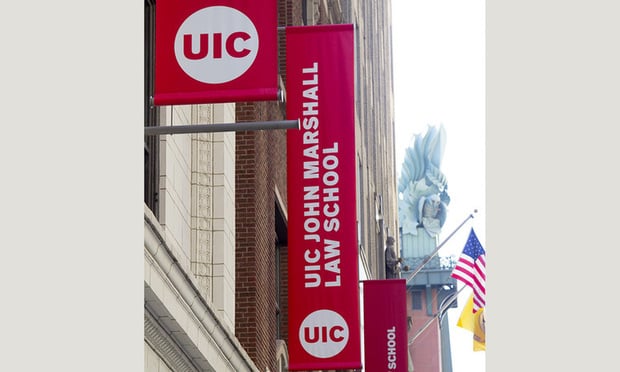Chicago's First Public Law School Makes Its Debut
The three-year transition of the John Marshall Law School as a standalone, private law school is now complete as students return to the newly christened University of Illinois Chicago John Marshall Law School. Dean Darby Dickerson explains what it means for the Windy City to finally have a public law school.
September 02, 2019 at 04:00 PM
6 minute read
 University of Illinois Chicago John Marshall Law School in 2019 indicate the completion of its transition from a standalone, private law school.
University of Illinois Chicago John Marshall Law School in 2019 indicate the completion of its transition from a standalone, private law school.
Chicago finally has a public law school.
The John Marshall Law School officially welcomed students back to campus on Aug. 26 as the University of Illinois Chicago John Marshall Law School, completing its transition from private, stand-alone institution to part of a large public university.
Administrators went public in November 2017 with their plans for the university to acquire the law school, saying that joining forces would strengthen both entities and make legal education in the Windy City more affordable. (No money exchanged hands, and all of John Marshall's assets transferred to the university.) John Marshall had been an independent law school for its 120-year existence.
The law school remains at its longtime downtown Chicago home, not far from the main UIC campus. With the change, Chicago now has five private law schools and one public law campus. Law.com caught up with law dean Darby Dickerson to discuss the transition and what difference returning students will—and won't—notice. Her answers have been edited for length and clarity.
How are the first few days going? So far so good. Everyone is really excited about the change.
 Darby Dickerson.
Darby Dickerson.Did you see any change in the number of applicants for this fall? Did going public prompt more people to apply? This time we had a little bit of an increase. I haven't seen the national stats yet, but I feel like our increases are consistent with the national trends I've heard more about anecdotally. We did receive more applications. We made fewer offers and received more acceptances. Our LSAT averages—75th percent, 50th percent and 25th percent—all moved up a point. I know the median GPA now exceeds 3.2. We had been under 3.2. It was a good year, but we had to recruit as the John Marshall Law School last year. Some people knew about [the transition], but we didn't get the final accreditation sign-offs until the very end of June. This will be our first year recruiting as the UIC John Marshall Law School.
Do you think in future years becoming part of UIC will give you an admission boost? Absolutely.
Is tuition different this year compared with last year, when you were a private school? It is. The tuition at John Marshall last year was about $47,500. For in-state students, the tuition is now $1,200 a credit hour, which is down from $1,565 a credit hour. Out-of-state students pay $1,500 a credit hour. For out-of-state students, it turns out to be about a wash, because the fees in a state system are higher than they were in a private institution. But our in-state students are paying less. So the tuition went down about $10,000 for in-state students, but the fees went up a couple thousand dollars. So it's about a free year for those not on scholarship
Is that a key to making the school more attractive to applicants? I think it's that, and being part of the University of Illinois System, and being part of a Research I institution. [Research I is a designation for U.S. universities that engage in a high level of research.] We're just now getting to the point where we're starting to build out the dual degree programs and the interdisciplinary certificate programs. I think that will attract students. Even though we had nice amenities here, we now have dorms and apartments. Some of our entering law students opted to go into university housing. They have recreational facilities that we didn't have. They have other services that we weren't able to offer as a standalone.
What other tangible differences are returning students going to notice this year? Our goal for this year was to keep the student experience as seamless as possible given the complexity of the transaction that just occurred. The biggest change is that they see all the new signs. But they see the same people in the building. We took all our faculty over with us and all but three of our staff over with us. All the services we offered before continue to be offered. The biggest changes for our students are what they see in the building. We took a whole floor of the library and turned it into a collaborative commons so there are all new study rooms and collaboration booths. We have a new clothes closet. For the students, we wanted it to continue to feel like home.
What is the clothes closet? About two years ago we started a food pantry on campus for those who may have food insecurity. A lot of our students come from underrepresented minority groups and from lower socioeconomic neighborhoods. They also work, and they have to do a clinic or externship. We went out to our alums, faculty and staff and took donations of professional attire—suits, slacks and jackets. And we've created a professional clothes closet so students can go in, on their honor, and take what they need. They don't have to return it. And they're able to go to interview or their part-time jobs, or participate in their clinic or externship.
I've never heard of this at a law school before. Have you? I actually got the idea from a public defender's office, which had a clothes closet for their clients when they needed to go to court. We did find some other local universities that have clothes closets, and we've heard that one other law school either just opened one or plans to.
What do you see as the single biggest benefit of joining the University of Illinois Chicago? One is the affordability for in-state students. There are six law schools on Chicago. Until 12 days ago, we were all private, and the lowest tuition was in that $47,000 dollar band going up from there. To have a more affordable option on the city of Chicago is a true benefit.
I think being part of a strong Research I institution, our goal is going to be to train students in interdisciplinary processes: To have different graduate programs working with us in our clinics, such as social work or disability services, and even some of the health and medical fields. And to be able to pursue these dual degrees or just to go over and take these additional classes that relate to the area of law you want to go into eventually.
This content has been archived. It is available through our partners, LexisNexis® and Bloomberg Law.
To view this content, please continue to their sites.
Not a Lexis Subscriber?
Subscribe Now
Not a Bloomberg Law Subscriber?
Subscribe Now
NOT FOR REPRINT
© 2025 ALM Global, LLC, All Rights Reserved. Request academic re-use from www.copyright.com. All other uses, submit a request to [email protected]. For more information visit Asset & Logo Licensing.
You Might Like
View All
The Met Hires GC of Elite University as Next Legal Chief

A Jury to Determine Whether Stairs Were Defectively Designed in Injury Case, State Appellate Court Rules
5 minute read
LSAT Administrator Sues to Block AI Tutor From Using ‘Famous, Distinctive’ Test Prep Materials
3 minute read
'Everything From A to Z': University GCs Tested by Legal, Financial, Societal Challenges
6 minute readTrending Stories
- 1'It's Not Going to Be Pretty': PayPal, Capital One Face Novel Class Actions Over 'Poaching' Commissions Owed Influencers
- 211th Circuit Rejects Trump's Emergency Request as DOJ Prepares to Release Special Counsel's Final Report
- 3Supreme Court Takes Up Challenge to ACA Task Force
- 4'Tragedy of Unspeakable Proportions:' Could Edison, DWP, Face Lawsuits Over LA Wildfires?
- 5Meta Pulls Plug on DEI Programs
Who Got The Work
Michael G. Bongiorno, Andrew Scott Dulberg and Elizabeth E. Driscoll from Wilmer Cutler Pickering Hale and Dorr have stepped in to represent Symbotic Inc., an A.I.-enabled technology platform that focuses on increasing supply chain efficiency, and other defendants in a pending shareholder derivative lawsuit. The case, filed Oct. 2 in Massachusetts District Court by the Brown Law Firm on behalf of Stephen Austen, accuses certain officers and directors of misleading investors in regard to Symbotic's potential for margin growth by failing to disclose that the company was not equipped to timely deploy its systems or manage expenses through project delays. The case, assigned to U.S. District Judge Nathaniel M. Gorton, is 1:24-cv-12522, Austen v. Cohen et al.
Who Got The Work
Edmund Polubinski and Marie Killmond of Davis Polk & Wardwell have entered appearances for data platform software development company MongoDB and other defendants in a pending shareholder derivative lawsuit. The action, filed Oct. 7 in New York Southern District Court by the Brown Law Firm, accuses the company's directors and/or officers of falsely expressing confidence in the company’s restructuring of its sales incentive plan and downplaying the severity of decreases in its upfront commitments. The case is 1:24-cv-07594, Roy v. Ittycheria et al.
Who Got The Work
Amy O. Bruchs and Kurt F. Ellison of Michael Best & Friedrich have entered appearances for Epic Systems Corp. in a pending employment discrimination lawsuit. The suit was filed Sept. 7 in Wisconsin Western District Court by Levine Eisberner LLC and Siri & Glimstad on behalf of a project manager who claims that he was wrongfully terminated after applying for a religious exemption to the defendant's COVID-19 vaccine mandate. The case, assigned to U.S. Magistrate Judge Anita Marie Boor, is 3:24-cv-00630, Secker, Nathan v. Epic Systems Corporation.
Who Got The Work
David X. Sullivan, Thomas J. Finn and Gregory A. Hall from McCarter & English have entered appearances for Sunrun Installation Services in a pending civil rights lawsuit. The complaint was filed Sept. 4 in Connecticut District Court by attorney Robert M. Berke on behalf of former employee George Edward Steins, who was arrested and charged with employing an unregistered home improvement salesperson. The complaint alleges that had Sunrun informed the Connecticut Department of Consumer Protection that the plaintiff's employment had ended in 2017 and that he no longer held Sunrun's home improvement contractor license, he would not have been hit with charges, which were dismissed in May 2024. The case, assigned to U.S. District Judge Jeffrey A. Meyer, is 3:24-cv-01423, Steins v. Sunrun, Inc. et al.
Who Got The Work
Greenberg Traurig shareholder Joshua L. Raskin has entered an appearance for boohoo.com UK Ltd. in a pending patent infringement lawsuit. The suit, filed Sept. 3 in Texas Eastern District Court by Rozier Hardt McDonough on behalf of Alto Dynamics, asserts five patents related to an online shopping platform. The case, assigned to U.S. District Judge Rodney Gilstrap, is 2:24-cv-00719, Alto Dynamics, LLC v. boohoo.com UK Limited.
Featured Firms
Law Offices of Gary Martin Hays & Associates, P.C.
(470) 294-1674
Law Offices of Mark E. Salomone
(857) 444-6468
Smith & Hassler
(713) 739-1250








